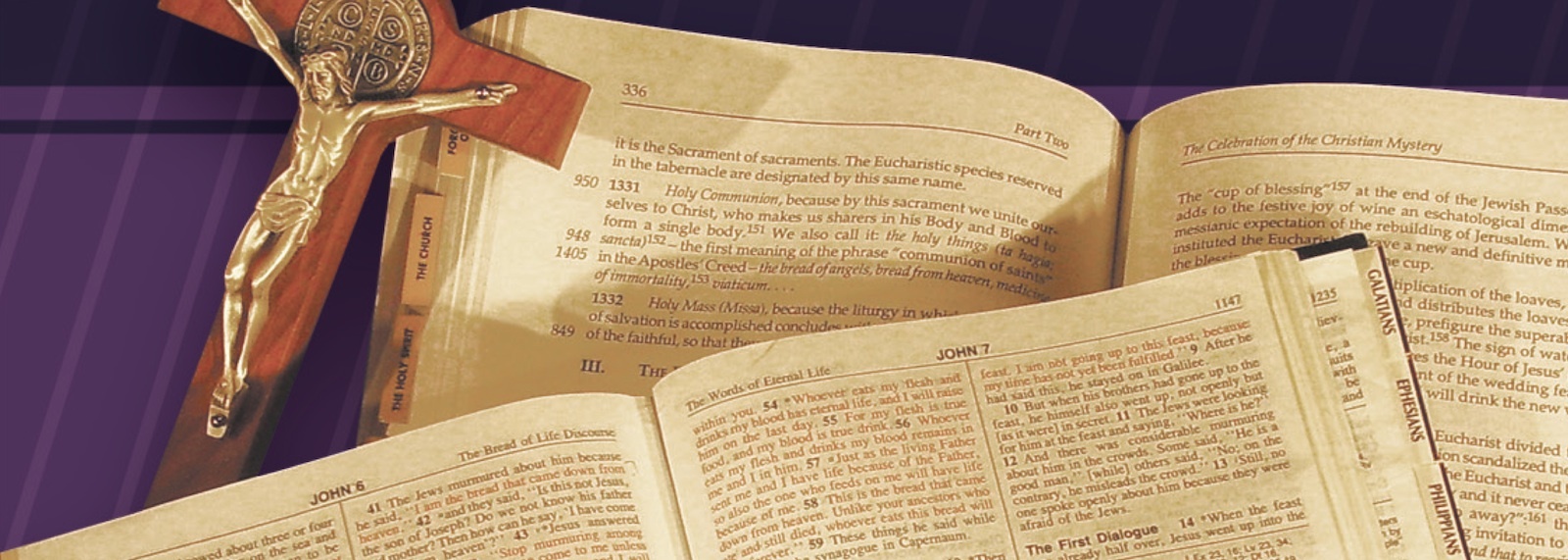Episodes

Saturday Nov 29, 2014

Thursday Nov 20, 2014
Freed from the bond of sin, who will we serve? Romans 7:1-6
Thursday Nov 20, 2014
Thursday Nov 20, 2014
In answer to a listener email, we discuss how there are indeed ways in which we have, either blindly or willingly, become enslaved by our modern industrialist culture, particularly through our over dependence upon technology.
In today’s text, Romans 7:1-6, we see proof that the re-emphasis by Jesus of the original indissolubility of marriage has become the accepted norm of the Christian community. Paul assumes his Christian audience agrees that the marriage bond cannot be broken except by death. He then uses this assumption as an analogy of how our death in Christ has broken our bonds to sin. The question is, now that we are freed from the bond of sin, who will we serve?

Friday Nov 14, 2014
The Wages of Sin is Death, Romans 6:12-23
Friday Nov 14, 2014
Friday Nov 14, 2014

Friday Nov 07, 2014
Praying to Saints and Dying to Sin, Romans 6:1-14
Friday Nov 07, 2014
Friday Nov 07, 2014
On today’s episode of Deep in Scripture, Marcus and Ken start by taking a listener question on the scriptural bases for prayer to the saints and for our departed loved ones. They examine some relevant scriptures and then turn to the tradition present in the Early Church Fathers to see how the early Christians regarded such practices. They then move on to their continuing study of Romans 6:1-14, discussing Baptism and how Christians should respond to sin.

Friday Oct 31, 2014
"Where sin increased, grace abounded all the more", Romans 5:12-2
Friday Oct 31, 2014
Friday Oct 31, 2014
EMAIL:
Dear Mr. Grodi and Dr. Howell:
A short time ago, you had some discussion in Deep in Scripture about salvation. I was wondering if you could tell me how you would respond to the following view about salvation and hell that there’s been a very long discussion about: “God is all powerful, God is all loving, has created us and wants us all to be saved; therefore He will find a way to make us all want to be saved and choose Him. No one will go to hell, because God hasn’t stepped off of the throne. Catholics are saying that God is not all powerful and sovereign and can’t make what He wants to happen happen. God would not create us to let us lose such an important thing as salvation.” Thank you very much for your help and for all of the information that you provide to people.

Monday Oct 27, 2014
Romans 5:1-11
Monday Oct 27, 2014
Monday Oct 27, 2014
Email:
Dear Marcus and Dr. Howell, in last week’s slight detour from Romans into James, there is a verse that you avoided. Could you briefly discuss James 2:12, “So speak and so act as those who are to be judged under the law of liberty.” Doesn’t this refer to the freedom that Luther proclaimed when he said that a person in faith was now free from any laws constricting their lives? Thanks, Marian

Wednesday Oct 15, 2014
Special Episode: Fr. Benedict Groeschel on "Authentic and Inauthentic Renewal"
Wednesday Oct 15, 2014
Wednesday Oct 15, 2014

Monday Oct 13, 2014
Listener Question on Faith and Works, James 2
Monday Oct 13, 2014
Monday Oct 13, 2014
Listener Email:
Dear Marcus and Ken:
I really appreciate the way you have been discussing St. Paul’s doctrine of justification in Romans on Deep in Scripture. The question that keeps coming up in my mind is how this all relates to what St. James says in James 2:14-26 about faith and works. At one point James says “You see that a man is justified from works and not from faith alone.”(v 24). Does this contradict Paul’s teaching? How would you explain this problem?
Sincerely,Jack

Thursday Oct 02, 2014
Servile vs Filial Fear and the Continued Study of Romans 4:13-25
Thursday Oct 02, 2014
Thursday Oct 02, 2014
EMAIL:
Dear Ken and Marcus, Last week, you discussed Romans 4:4: “Now to one who works, his wages are not reckoned as a gift but as his due.” Recently someone pointed out Phil 2:12, “work out your own salvation with fear and trembling.” Could you compare and contrast these, and discuss how they relater to servile and filial fear? Thanks, Bob
Romans 4:13-25
13: The promise to Abraham and his descendants, that they should inherit the world,
did not come through the law but through the righteousness of faith.
14: If it is the adherents of the law who are to be the heirs,
faith is null and the promise is void.
15: For the law brings wrath,
but where there is no law there is no transgression.
16: That is why it depends on faith,
in order that the promise may rest on grace and be guaranteed to all his descendants -- not only to the adherents of the law
but also to those who share the faith of Abraham, for he is the father of us all,
17: as it is written, "I have made you the father of many nations"
-- in the presence of the God in whom he believed,
who gives life to the dead and calls into existence the things that do not exist.
18: In hope he believed against hope,
that he should become the father of many nations;
as he had been told, "So shall your descendants be."
19: He did not weaken in faith when he considered his own body,
which was as good as dead because he was about a hundred years old,
or when he considered the barrenness of Sarah's womb.
20: No distrust made him waver concerning the promise of God,
but he grew strong in his faith as he gave glory to God,
21: fully convinced that God was able to do what he had promised.
22: That is why his faith was "reckoned to him as righteousness."
23: But the words, "it was reckoned to him," were written not for his sake alone,
24: but for ours also.
It will be reckoned to us
who believe in him that raised from the dead Jesus our Lord,
25: who was put to death for our trespasses
and raised for our justification.

Friday Sep 26, 2014
Continuing Romans 4:1-12
Friday Sep 26, 2014
Friday Sep 26, 2014
EMAIL:
Dear Marcus and Ken, I regularly post comments on a discussion site which has a lot of Bible only Christians. ... One of the things I notice with this group is they go to the OT a LOT and the epistles but seem to ignore the Gospels and any parts of the Epistles that don't jive with their thinking (like most of James). Fear is very prevalent among them and the God they present looks more like the Terminator. Any help you can give me will be appreciated as when I post I try to write for those who may happen upon the conversation who may or may not be Bible Believers. Thank you, Carolyn

